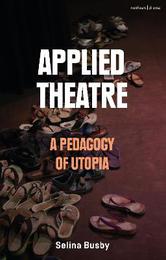
|
Applied Theatre: A Pedagogy of Utopia
Paperback / softback
Main Details
| Title |
Applied Theatre: A Pedagogy of Utopia
|
| Authors and Contributors |
By (author) Selina Busby
|
| Physical Properties |
| Format:Paperback / softback | | Pages:272 | | Dimensions(mm): Height 216,Width 138 |
|
| Category/Genre | Drama
Community and outreach services |
|---|
| ISBN/Barcode |
9781350232815
|
| Classifications | Dewey:792.022 |
|---|
| Audience | | Tertiary Education (US: College) | |
|---|
|
Publishing Details |
| Publisher |
Bloomsbury Publishing PLC
|
| Imprint |
Methuen Drama
|
| Publication Date |
6 October 2022 |
| Publication Country |
United Kingdom
|
Description
Shortlisted for the 2022 TaPRA David Bradby Monograph Prize Applied Theatre: A Pedagogy of Utopia offers a critical consideration of long-term applied and participatory theatre projects. In doing so, it provides a timely analysis of concepts that inform applied theatre and outlines a new way of thinking about making theatre with differing groups of participants. The book problematizes key concepts including safe spaces, voice, ethical practice and resistance. Selina Busby analyses applied theatre projects in India, the USA and the UK, in youth theatres, homeless shelters, prisons and with those living in informal housing settlements to consider her key question: what might a pedagogy of utopia look like? Drawing on 20 years of practice in a range of contexts, this book focuses on long-term interventions that raise troubling questions about applied theatre, cultural colonialism and power, while arguing that community or participatory theatre conversely has the potential to generate a resilient sense of optimism, or what Busby terms, a 'nebulous utopia'.
Author Biography
Selina Busby is Principal Lecturer in Applied & Community Performance at the Royal Central School of Speech and Drama, University of London, UK. She is a theatre practitioner who makes performances with a wide range of community groups across the globe.
ReviewsI have recommended Selina Busby's Applied Theatre: A Pedagogy of Utopia to both colleagues and students and have found inspiration in its pages myself. In her words, the book focuses on 'the positive contribution that making theatre can have when thinking about and acting for social justice, in opening up possibilities or "the field of the possible," in enhancing aspirational thinking and resisting what is, in order to create what is not yet, but which can be imagined' (pp. 204-205). The power of hope is the most potent force when facing inequity and injustice; theatre can give voice and agency and creative expression to those who may lack these in their lives. Busby's global survey of her practice is required reading for anyone who wants to be inspired, or re-inspired, with the reality that theatre can and does make tangible differences in peoples' lives. * Monica Prendergast, University of Victoria, Canada * [R]eaders are engrossed in the author's eloquent theoretical argument blended with her engaging storytelling of each different applied theatre project. Not only inspiring but also a critically necessary read for applied theatre students in our current time of trouble. * Wan-Jung Wang, Professor of Applied Theatre, National University of Tainan, Taiwan *
|